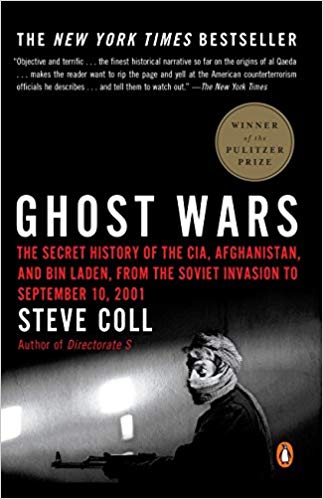News Desk |
Steve Coll has made a name for himself as one of the foremost reporters of this generation. He is the author of seven non-fiction books. He has been the senior editor at the Washington Post and was managing director of the post between 1998 and 2004. He has covered American and international politics, national security and intelligence issues. His book ‘Ghost Wars’ is the winner of the Pulitzer Prize and the Overseas Press Club Award. It arguably offers the most gripping narrative account of the origins of Al-Qaeda and the role various actors played in it.
The book spans 32 chapters and is divided into three parts, covering nearly 600 pages. And the author doesn’t stand on ceremony. Each chapter and page is filled with vital pieces of information. It is difficult to skip a chapter or two and carry on reading without losing the context of the broader picture of history the writer tries to build. There is a near constant chronological order to the book, with occasional leaps back and forth between different countries, regions and times. I found it easier to read a couple of chapters daily instead of reading big chunks of it in a single sitting. For those not used to reading non-fiction, the book may feel a bit dense.
The State Department might have a policy of its own, the CIA and the Pentagon might be pursuing a different parallel policy to achieve the same objectives.
The author relies on interviews he conducted with people who helped shape historical events, memos in the White House, confidential CIA memos mostly concerned with detailing the legal authority CIA officers had in killing or capturing Osama bin Laden, raw intelligence in the form of telephone intercepts and information obtained from interrogation, reports by intelligence analysts and memoirs. According to the New York Review of Books, ‘the CIA itself would be hard put to beat his grasp of global events.’
What keeps the tale refreshing, chapter after chapter is the writing style of the author. At times blunt but always fiercely honest and frank, Steve Coll’s technique to story-telling is why this book won the Pulitzer Prize. It almost feels as if the story is being narrated by your friend in an informal setting. When describing characters, Coll often goes into their histories, their motivations, desires, and biases. This puts a human touch to the overall narrative where intelligence officers, Islamists and Jihadists, statesmen, politicians, and military leaders are all trying their best to do their jobs or fulfill their aims but factors beyond their control often hamper their ability to do so.
Read more: Willem Dafoe: ‘I flirted with Van Gogh’s ghost’
Coll seems to have an insider view of how politics works in Washington. The relationship between the CIA chief and the President of the US ultimately affects budget, morale, and performance of officers belonging to the intelligence community. The machine of inter-departmental bureaucracy in the US seems to have a mind of its own. There’s little that the white house, preoccupied with the political fall-out of all if any, CIA operation to kill or capture bin Laden, can do to manipulate this vast apparatus the way it wants.
The State Department might have a policy of its own, the CIA and the Pentagon might be pursuing a different parallel policy to achieve the same objectives. There are people supposedly on top of things in Washington but it’s difficult to say who is in complete or near totals control at any given time. Occasionally, the book churns up remarkable facts that made me stop and think for a while.
Read more: US interventionism produced the 9/11 attacks
For instance, at the risk of spoiling the book, when the FBI announced a $5 million bounty for Bin Laden, the Al-Qaeda chief offered a $9 million bounty of any of the four top CIA officers. In stark contrast to the image that political leaders maintain in public, the insecurity that they often feel under the pressure of decisions that may affect millions or cause unacceptable political fall-out is portrayed expertly by the author. In hindsight, it certainly seems as if there were innumerable opportunities to nip Al-Qaeda in the bud.
But Steve Coll does an excellent job of explaining the conditions under which decisions in real time are made. As soon as I finished reading it, I began checking out where to buy the sequel to Ghost Wars, ‘Directorate S’ which continues the story after 9/11 till recent years. This Pulitzer prize winner truly lives up to its reputation.














